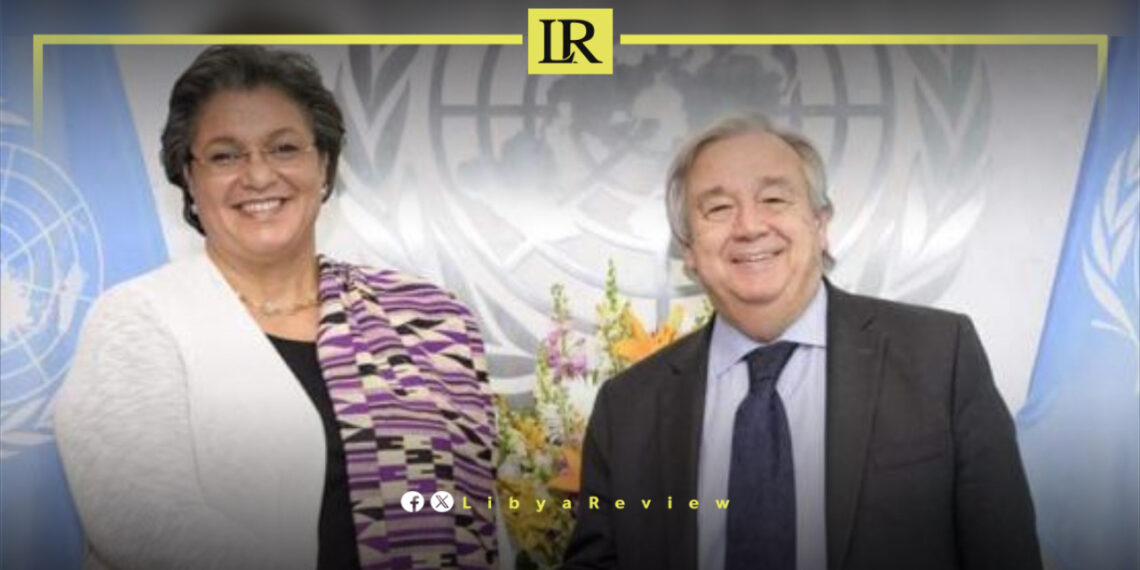Since the United Nations established its mission in Libya in 2011 following the fall of Muammar Gaddafi, the country has seen nine UN envoys come and go, none of whom managed to resolve the political crisis. Critics argue that their lack of neutrality and insistence on imposing external solutions have only deepened Libya’s divisions.
Libya now appears poised to welcome a tenth UN envoy. UN Secretary-General António Guterres has expressed his intent to appoint Ghanaian diplomat Hanna Tetteh to lead the United Nations Support Mission in Libya (UNSMIL), succeeding outgoing envoy Abdoulaye Bathily, inheriting the challenge of steering a deeply divided nation toward stability, unity, and long-awaited elections.
Tetteh, a seasoned diplomat with extensive international experience, served as Ghana’s Foreign Minister from 2013 to 2017. She also held prominent roles within the UN, including as Special Representative to the African Union and Special Envoy for the Horn of Africa. Her background positions her well to navigate Libya’s complex political landscape, but her appointment comes amid mounting skepticism over the UN mission’s ability to resolve the country’s enduring crisis.
Since the UN established its mission in Libya in 2011 following the fall of Muammar Gaddafi, nine envoys have come and gone, each failing to bridge the country’s political divides. Instead, critics argue, UNSMIL’s involvement has often deepened Libya’s fragmentation by imposing external solutions that lack national consensus.
Libya remains split between rival administrations: the eastern-based House of Representatives, and the Tripoli-based Government of National Unity (GNU), led by Abdulhamid Dbaiba. Efforts to reconcile these factions have repeatedly stalled, with disputes over electoral laws, governance, and foreign interference perpetuating the deadlock.
Tetteh’s potential appointment comes on the heels of an initiative launched by Acting UNSMIL Head Stephanie Khoury, who proposed a new political process modeled after the Libyan Political Dialogue Forum (LPDF). This initiative aimed to create a unified government and pave the way for elections. Khoury had already begun engaging Libyan stakeholders to build momentum for the plan.
However, Tetteh’s arrival raises questions about whether Khoury’s efforts will continue under new leadership. Libyan observers worry that a change in envoys may disrupt the fragile progress made in recent months, leaving the country no closer to resolving its crises.
Libyan leaders have expressed growing frustration with the UN mission. Deputy Speaker of the House of Representatives, Fawzi Al-Nuwairi, recently criticised UNSMIL’s role, stating, “Relying on the UN mission has proven to be a waste of time. The appointment of a tenth envoy is just another chapter in a series of failures.”
Al-Nuwairi emphasized the need for a purely Libyan solution, driven by the will of the people. He called for free and fair elections, a permanent constitution, and comprehensive national reconciliation, warning that external mediation often prolongs crises rather than resolving them.
Tetteh’s success will depend on her ability to build trust among Libyan stakeholders and prioritize national ownership of the reconciliation process. Without a genuine commitment from Libya’s leaders to put national interests above factional gains, even the most well-intentioned international efforts are likely to falter.
Libya’s path forward hinges on more than just international mediation. It requires a concerted effort from Libyans themselves to address their divisions, restore legitimacy to institutions, and lay the groundwork for lasting stability.


